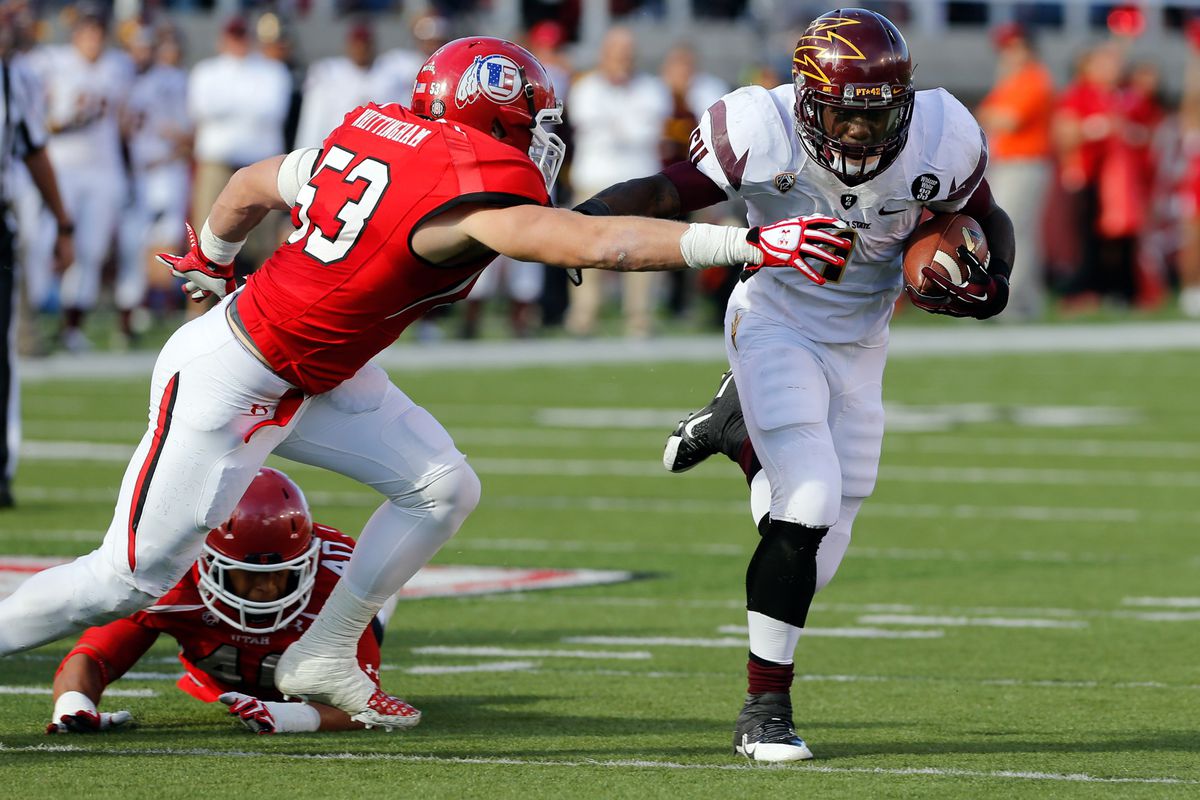university.nakul@gmail.com | Posted on | sports
Utah vs. Arizona State: Sun Devils Claim Victory in Thrilling Game
university.nakul@gmail.com | Posted on
The world of college football is always rife with excitement, drama, and unexpected twists. The matchup between the No. 16 ranked Utah Utes and the Arizona State Sun Devils on October 11, 2024, at Mountain America Stadium in Tempe, Arizona, was no exception. This game not only showcased the athletic prowess of both teams but also highlighted the intense rivalries that are a hallmark of college sports.

Historical Context
Rivalry Overview
The Utah-Utah State rivalry has deep roots that date back to their first meeting in 1976. Historically, Arizona State has dominated this matchup with a record of 22 wins to Utah's 12. However, in recent years, the Utes have flipped the script, winning four consecutive games leading up to this contest. The stakes were high as both teams entered the game with aspirations for a successful season in their first year in the Big 12 Conference.
Team Backgrounds
1. Utah Utes
The Utah Utes entered the game with a record of 4-1 and were ranked No. 16 in the nation. Under head coach Kyle Whittingham, the Utes have built a reputation for their tough defense and disciplined play. However, injuries had plagued their season, particularly affecting their starting quarterback, Cam Rising. Rising's return from injury was highly anticipated but raised questions about his effectiveness.
2. Arizona State Sun Devils
The Arizona State Sun Devils, led by head coach Kenny Dillingham, were looking to establish themselves as a competitive force in the Big 12. With a record of 3-2 prior to this game, ASU was eager to claim a signature victory against a ranked opponent. The Sun Devils had shown flashes of brilliance throughout the season but needed consistency to elevate their performance.
Game Day Atmosphere
1. Pre-Game Excitement
As fans filled Mountain America Stadium, the atmosphere was electric. Tailgating festivities included food trucks, live music, and spirited discussions about team strategies. Both fan bases were passionate and vocal, creating an environment that made it clear how much this game meant to them.
2. Kickoff
As the teams took the field for kickoff, anticipation reached its peak. The Utes wore their traditional red uniforms while Arizona State sported their striking maroon and gold attire. The stadium erupted as the referee blew the whistle to start the game.
First Half Breakdown
1. First Quarter
The first quarter began with both teams feeling each other out. Utah received the opening kickoff and started strong with an impressive drive that showcased Micah Bernard's versatility as a running back. However, they stalled in ASU territory and settled for a field goal, taking an early lead at 3-0.
Arizona State responded quickly with their own offensive series led by quarterback Sam Leavitt. The Sun Devils managed to move downfield effectively but were halted by a solid Utah defense that forced them into a field goal attempt. Kicker Carter Brown converted from 42 yards, leveling the score at 3-3.
2. Second Quarter
As the second quarter unfolded, both defenses tightened up significantly. Utah’s defense showcased its prowess with several key tackles for loss and pass deflections. However, Arizona State found its rhythm midway through the quarter when Leavitt connected with wide receiver Elijah Badger for a 25-yard touchdown pass, putting ASU ahead 10-3.
Utah struggled to find offensive consistency as Cam Rising appeared tentative in his throws. His limitations became evident as he faced pressure from ASU’s defensive line. Despite this adversity, Rising managed to lead a drive that culminated in another field goal attempt—this time from 40 yards—which was successful, narrowing ASU's lead to 10-6.
With just under two minutes remaining in the half, Arizona State took control again. A series of runs by Cam Skattebo set up another scoring opportunity for ASU. They capitalized on a defensive misalignment by Utah and scored another touchdown through Skattebo on a 3-yard rush, extending their lead to 17-6 before halftime.
3. Halftime Analysis
As both teams retreated to their locker rooms for halftime adjustments, coaches had plenty to discuss. For Utah, finding ways to protect Rising and generate more offense was paramount. Meanwhile, Arizona State aimed to maintain momentum while tightening up its defensive coverage against Utah's potent running game.
Second Half Breakdown
1. Third Quarter
The second half began with renewed energy from both sides. Utah received the kickoff but quickly faced adversity when Rising threw an interception on just their second play of the drive—an ill-timed pass that was picked off by ASU linebacker Jaden Williams.
Arizona State capitalized on this turnover immediately; Leavitt orchestrated an efficient drive that culminated in another touchdown pass—this time connecting with tight end Jalin Conyers for a 15-yard score—pushing ASU's lead to 24-6.
Utah needed an answer quickly and turned to Bernard once again. He broke free for several explosive runs that energized his teammates and fans alike. This culminated in Bernard scoring on a 5-yard rush, bringing Utah back into contention at 24-13.
2. Fourth Quarter
As the fourth quarter commenced, tensions ran high on both sidelines. Utah’s defense stepped up significantly; they forced Arizona State into several three-and-out situations as they sought to regain control of the game.
With about eight minutes left on the clock, Rising began to find his rhythm despite earlier struggles. He led a sustained drive downfield that showcased his resilience and determination. This culminated in another touchdown run by Bernard from 8 yards out, narrowing ASU’s lead further to 24-19.
With momentum shifting toward Utah and time winding down, they faced a critical fourth down deep in ASU territory with just under two minutes remaining in regulation. Instead of opting for a field goal that could have brought them within two points, Utah decided to go for it—a decision that would ultimately haunt them as they failed to convert.
Arizona State took over possession and managed to run out the clock effectively, sealing their victory at 27-19.

Post-Game Analysis
1. Key Takeaways
- Quarterback Play: Cam Rising’s limitations were evident throughout much of the game due to his recent injury recovery. While he displayed moments of brilliance, his inability to consistently connect with receivers proved detrimental.
- Defensive Struggles: Both teams exhibited moments of defensive prowess but also vulnerabilities that could be exploited moving forward into conference play.
- Coaching Decisions: The decision by Utah’s coaching staff to go for it on fourth down instead of attempting a field goal will be debated among fans and analysts alike as it significantly impacted momentum late in the game.
- Emergence of Stars: Micah Bernard shone brightly despite his team’s loss; he proved himself as one of Utah’s most valuable players moving forward.
- Arizona State’s Resilience: The Sun Devils demonstrated grit and determination throughout this contest; their ability to capitalize on turnovers proved crucial in securing victory.
2. Season Implications
Following this defeat, Utah's record fell to 4-2, raising serious concerns about their aspirations within the Big 12 Conference after suffering two losses already this season. Their upcoming matchup against TCU will be critical; they must regroup quickly if they hope to remain competitive in the conference standings.
Conversely, Arizona State improved its record to 4-2, gaining valuable momentum heading into subsequent games against fellow conference opponents like Baylor and Oklahoma State—both crucial matchups that could define their season trajectory.
Looking Ahead
1. For Utah
Utah must address several key areas moving forward:
- Quarterback Health: Ensuring Cam Rising is fully healthy will be paramount if they want any chance at competing at a high level.
- Offensive Line Protection: Improving protection schemes will be essential for allowing Rising time in the pocket while also creating lanes for Bernard.
- Defensive Adjustments: Addressing missed tackles and coverage breakdowns will be critical as they face potent offenses in upcoming games.
2. For Arizona State
Arizona State will look to build on this victory:
- Consistency on Offense: Maintaining offensive efficiency will be vital as they face tougher defenses moving forward.
- Defensive Cohesion: Continued improvement on defense is necessary if they hope to make waves within conference play.
- Capitalizing on Momentum: Building off this win can provide confidence as they prepare for upcoming challenges.
Conclusion
The matchup between Utah and Arizona State served as an exciting chapter in college football history—a tale filled with drama, strategic decisions, and moments that could define seasons for both programs involved. As fans reflect on this game and look ahead toward future matchups within an evolving Big 12 landscape, one thing remains clear: college football continues to deliver thrilling narratives week after week.
In summary, while Arizona State celebrated its hard-fought victory over a ranked opponent, questions loom large over Utah's ability to bounce back from adversity—a storyline that will undoubtedly unfold as we progress deeper into this captivating season of college football.
0
